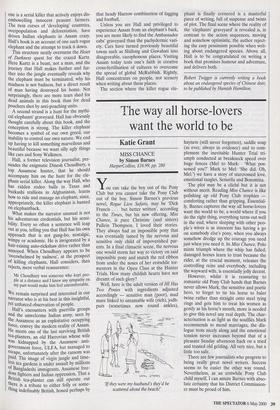The way all horse-lovers want the world to be
Katie Grant
You can take the boy out of the Pony Club but you cannot take the Pony Club out of the boy. Simon Barnes's previous novel, Rogue Lion Safaris, may be 'Dick Francis . . but better written', according to the Times, but his new offering, Miss Chance, is pure Christine (and sisters) Pullein Thompson. I loved their stories. They always had an impossible pony that was eventually tamed by the nervous and sensitive only child of impoverished par- ents. In a final climactic scene, the nervous one would storm her way to victory on said impossible pony and snatch the red ribbon from under the noses of her erstwhile tor- mentors in the Open Class at the Hunter Trials. How many childish hearts have not dreamt of such glory?
Well, here is the adult version of Jill Has Two Ponies with ingredients adjusted accordingly — sensitive man (poor), mad mare linked to untamable wife (rich), jodh- purs (sometimes now round ankles), `If they were my husband's they'd be scattered about the beach!' haynets (still never forgotten), saddle soap (as ever, always in evidence) and to com- plement the inevitable Hunter Trial tri- umph conducted at breakneck speed over huge fences (Mel to Mark: 'What pos- sessed you?' Mark to Mel: 'She did. Oh, Mel.') we have a story of starcrossed love, emotional tangles, Sexuella and Bosomina.
The plot may be a cliche but it is not without merit. Reading Miss Chance is like polishing up old Pony Club trophies comforting rather than gripping. Essential- ly, Barnes captures the way all horse-lovers want the world to be, a world where if you do the right thing, everything turns out well in the end, where sleeping with other peo- ple's wives is as innocent has having a go on somebody else's pony, when you always somehow dredge up the courage you need just when you need it. In Miss Chance, Polo mints triumph where the whip has failed; damaged horses learn to trust because the rider, at the crucial moment, releases the controlling reins and everybody, including the wayward wife, is essentially jolly decent.
However, whilst it is reassuring to romantic old Pony Club hands that Barnes never allows Mark, the sensitive and poetic hero, to forget to tie his horse to baler twine rather than straight onto steel tying rings and gets him to treat his women as gently as his horse's mouth, more is needed to give this novel any real depth. The char- acterisation is as light as the souffles Mark recommends to mend marriages, the dia- logue trots nicely along and the emotional tension never increases beyond that of a pleasant Sunday afternoon hack on a tried and trusted old gelding. All very nice, but a little too safe.
There are few journalists who progress to being really great novel writers. Success seems to be easier the other way round. Nevertheless, as an erstwhile Pony Club child myself, I can assure Barnes with abso- lute certainty that his District Commission- er must be proud of him.


































































 Previous page
Previous page